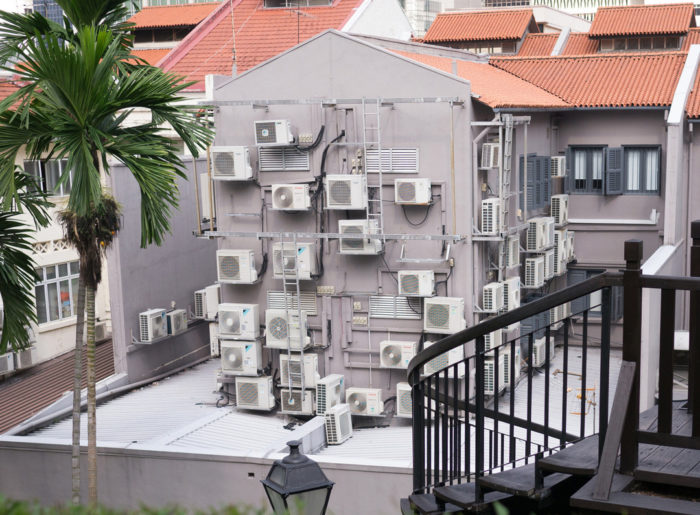
Image Credit: Schezar / CC Flickr
Today, most of the world’s air conditioners are concentrated in a handful of affluent countries, but a sharp increase in demand will triple the amount of energy used for space cooling by 2050 and require new generating capacity equal to what’s produced in the U.S., Japan, and the European Union today.
In a new report, The Future of Cooling, the International Energy Agency predicts that without government intervention to increase the efficiency of AC equipment, by mid-century the appliances will use as much electricity as all of China and India consume now.
In a statement posted at the IEA website, Executive Director Faith Birol called the trend “one of the most critical blind spots in today’s energy debate.” Setting higher efficiency standards, she said, is one of the easiest steps governments can take to reduce emissions, lower costs, and curb the need for new power plants.
AC units have their highest penetration today in Japan and the U.S., where 90% or more of all houses have air conditioning. After the next three in line — Korea (86%), Saudi Arabia (63%), and China (60%) — the percentage of households with air conditioning drops rapidly. Of the 2.8 billion people living in the world’s hottest places, only 8% now own air conditioning equipment.
But by 2050, the agency expects the total number of air conditioning units will top 1.4 billion in China, up from the current 643 million units today, and 1.1 billion in India, up from 36 million now. Globally, the number of AC units will jump from 1.6 billion to 5.6 billion — the equivalent of 10 new AC units sold every second for the next 30 years, the report says.
It will have a huge impact on energy use — what the IEA calls the coming “cold crunch.”
“Global growth is shifting south, to countries that experience high temperatures that
drive the demand for cooling, which is becoming affordable for more people as income levels
rise,” the report says. “The lion’s share of the projected growth in energy use for space cooling by 2050 comes from the emerging economies, with just three countries — India, China, and Indonesia — contributing half of global cooling energy demand growth.”
Using current policies and efficiencies as a “baseline scenario,” the report says that by 2050 the share of space cooling in total electricity use in buildings will rise to 30% overall. AC growth in hot countries also will make it more difficult to meet peak electricity loads; in India, space cooling will account for 45% of peak loads by 2050, up from just 10% today.
Making AC units and buildings more efficient
One problem, the IEA says, is that in all major markets today, buyers are selecting air conditioners with an average efficiency that is less than half of what’s available. Globally, the best available AC equipment is as much as five times as efficient as the least energy efficient models, and twice as efficient as the market average.
“As the most efficient devices tend to be more expensive (in part because of pricing strategies or because they incorporate additional features), consumers may decide not to purchase the more efficient equipment, even if the energy cost savings would ultimately make up for the additional upfront cost,” the report notes. “For example, the most efficient models in China can be twice as expensive as the least efficient ones on the market, requiring more than ten years to pay back the higher upfront cost of the unit at current electricity prices.”
Making AC equipment more efficient would substantially lower energy use in the future. What the IEA calls its “efficient cooling scenario” — a concerted effort to impose tougher efficiency and labeling standards — would keep increases in energy demand for cooling 45% lower than sticking with current practices (the baseline scenario). It also would reduce the need to build new power plants, collectively amounting to a savings of US$2.9 trillion through 2050.
As important as more efficient AC equipment, the IEA said, is lowering energy demands by improving the efficiency of buildings.
“The way buildings are designed and built, including the choice of materials used in their construction, can have a huge impact on the need for ACs and the subsequent energy needed to provide cooling services,” the report says. “Policies for more efficient ACs, combined with policies for more efficient buildings, could actually keep energy demand for cooling flat, while allowing strong growth in access to cooling for populations around the world. This would require much tougher building energy codes, which need to be well-thought-out, coordinated with renewable energy policies, and properly enforced.”
Codes hold “enormous potential” for reducing energy use, the IEA said. At the moment, however, most hot countries, where demand is growing rapidly for AC, do not have mandatory energy codes for buildings. Of the 130 billion square meters of new construction expected in the next 20 years, two-thirds of it will take place in countries that currently lack mandatory building energy requirements.
Weekly Newsletter
Get building science and energy efficiency advice, plus special offers, in your inbox.














2 Comments
Real photo?
Probably a stupidity question, but is that a real photo, or an artist's impression?
Response to Trevor Lambert
Trevor,
Go to Google Images, and type in "air conditioners in Hong Kong" or "air conditioners in Singapore" and you'll see lots of similar photos. Here are two more.
.
Log in or create an account to post a comment.
Sign up Log in